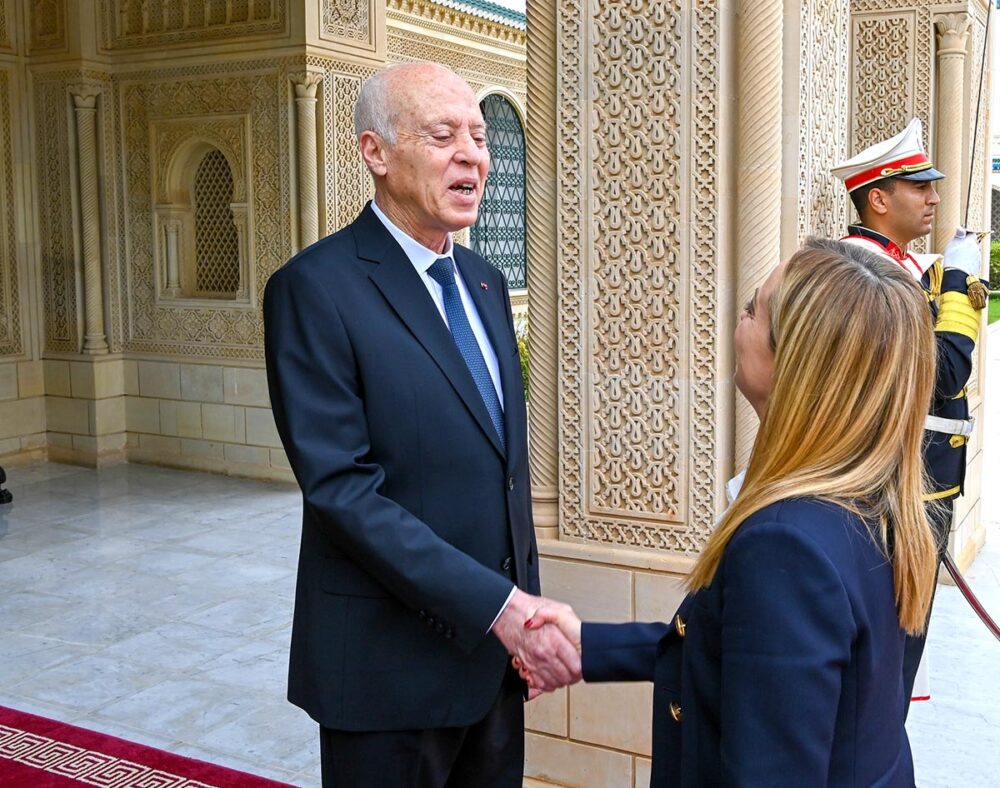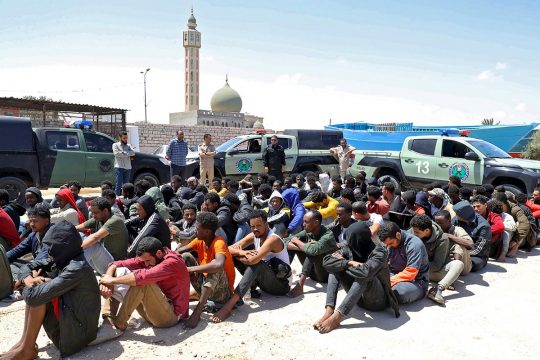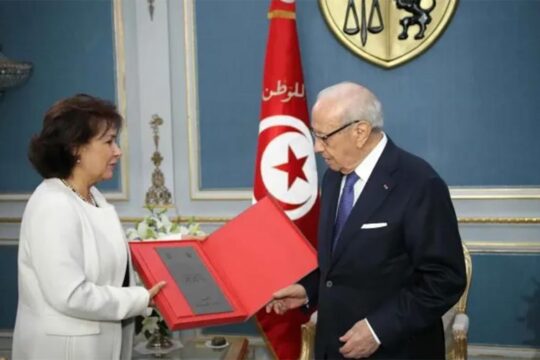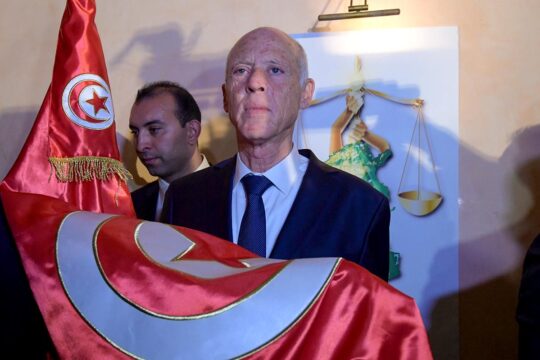On Tuesday September 23 Rodney Dixon, a British lawyer representing Tunisian detainees, sent a communication to the International Criminal Court (ICC) asking it to investigate two types of crime that could constitute crimes against humanity: the repression of President Kaïes Saïed’s political opponents; and the inhumane treatment inflicted on migrants from sub-Saharan Africa. This application supports a previous application filed with the ICC by the same lawyer on October 5, 2023, concerning the same alleged violations.
This choice to link the two types of crime – the relentless attack on local voices challenging the regime and the crimes against sub-Saharan migrants – is part of the legal strategy of a team of lawyers led by Dixon. He sees correlations between them.
For several months now, increasingly unbearable images have been circulating on social networks, through media like France24, and in reports by international organisations such as Human Rights Watch, of destitute migrants expelled by Tunisia and abandoned in desert areas bordering Algeria and Libya in the middle of summer.
The violence inflicted on these men, women and children (including beatings, torture, psychological harassment and multiple deprivations) is correlated, according to the lawyer, with the repression that is being unleashed on all Tunisians who dare to criticize the now authoritarian regime of President Saïed. Since his moves dubbed a “self-coup” on July 25, 2021, the president has monopolised all power, and is standing for re-election this Sunday October 6.
“Roads of Torture”
Refoulement operations are difficult to document. The Tunisian police go to great lengths to break migrants’ phones before deporting them, as reported in a collaborative study conducted by Inkyfada, Lighthouse Reports, The Washington Post, Der Spiegel, Enass Media, Le Monde, Irpi Media, Tagesschau, Por Causa and El Pais, published on May 24 this year. The World Organisation Against Torture (OMCT), in a study entitled “Roads of Torture” published at the end of 2023, considers that the living conditions to which refugees and asylum seekers have been subjected in the desert since the summer of 2023, as well as in the coastal areas where displaced people are concentrated – in El Amra and Beliana, in the southern Sfax region – may constitute torture.
On September 24, a press conference was organized in The Hague by the group that had referred the case to the ICC the day before. “From a legal point of view, we can speak here of violations of international law: murder, torture and rape. These crimes are committed on a widespread and systematic scale. This is what allows us to conclude that the ICC has jurisdiction, given the seriousness and brutality of the attacks, their scale and the fact that they are taking place in the same way in Libya and Tunisia,” explains British lawyer Dixon.
He points out that in Libya, the ICC has been officially conducting investigations since 2022 to determine the responsibility of armed groups, militias and state actors involved in crimes against migrants and refugees, including arbitrary detention, torture, murder, persecution, rape and slavery. On July 9, United Nations High Commissioner for Human Rights Volker Türk revealed the discovery of a mass grave of migrants’ bodies on the Tunisian-Libyan border.
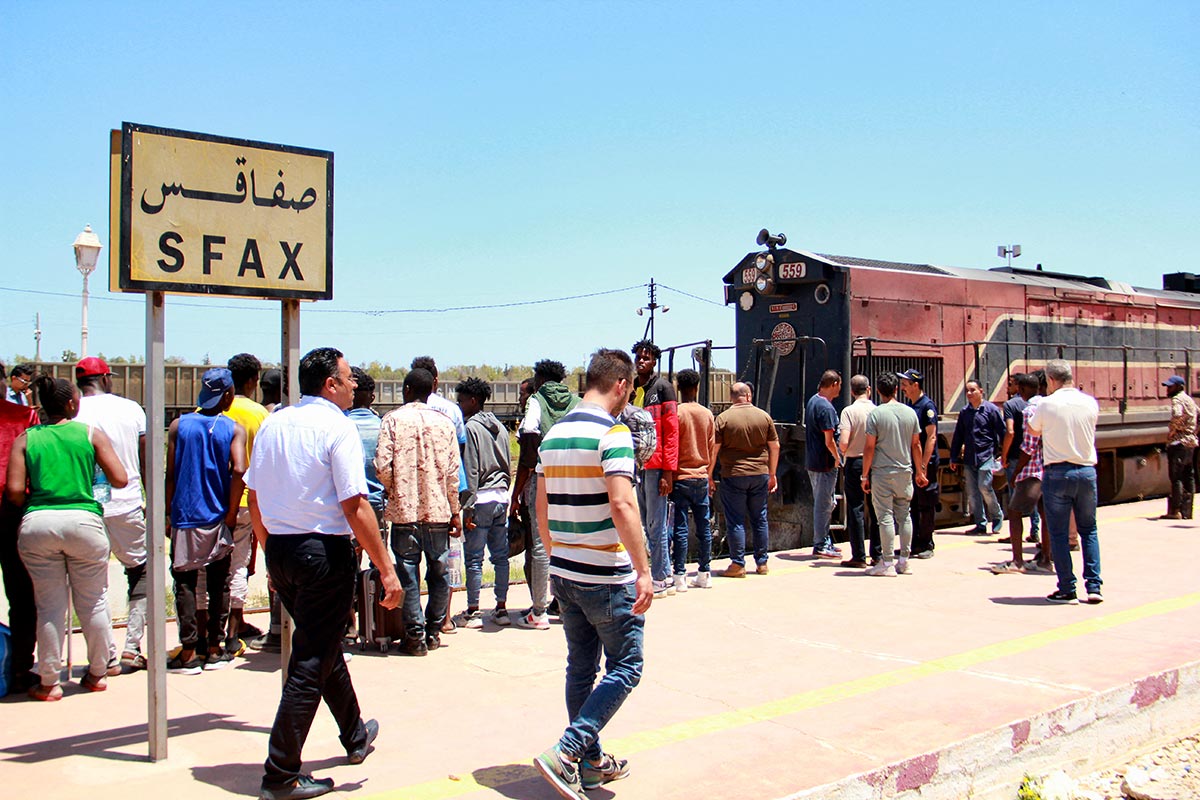
Presumed perpetrators: President Saïed and his ministers
“In our communication, we draw attention to the responsibility of a number of perpetrators,” said Dixon. These include current President Saïed, the former Minister of the Interior, the current Minister of the Interior, the Minister of Justice, the Minister of Defence and the heads of the army and national guard.”
In its “mapping of violations suffered by displaced people in Tunisia” carried out between July and October 2023, the OMCT confirms “the Tunisian State’s direct responsibility – the actions of the Tunisian authorities (mainly committed by the security forces, the police, national guard, army and coastguard) and indirect responsibility in the form of omissions or tolerance by state authorities towards violence committed by non-state actors (traffickers and smugglers)”.
In Tunis no comment, either official or unofficial, has filtered through the media about these actions initiated at the ICC to extend the Court’s Libyan investigation to Tunisia.
Scapegoats for the economic crisis
A turning point was reached in Tunisia after a communiqué dated February 21, 2023, in which President Saïed made no secret of the fact that he was putting in place “urgent measures” to curb the “presence of a large number of illegal migrants from sub-Saharan Africa”. He developed a Tunisian version of the replacement theory, pointing to the imagined danger that migrants would “reduce Tunisia to its African dimension and strip it of its Arab and Islamic identity”.
In the days following this statement, hundreds of sub-Saharan Africans were stripped of their jobs and evicted from their homes, often in the middle of the night, without warning, and without being able to take anything with them, let alone get their deposits back. Having become the scapegoats for a deep economic crisis, the migrants were subjected to a wave of violence wherever they went, on buses, in the metro, in the street, without being able to lodge a complaint in Tunisia since their administrative situation deprives them of this right.
Intercepted at sea and left in the desert
The first week of July marked another turning point in the scale of the violence. According to the OMCT’s report, the first group was on July 2 forcibly displaced to the militarized zone on the Libyan border. On July 3, following the death of a Tunisian citizen in Sfax during a fight with black African migrants, the city experienced an unprecedented wave of racial hatred targeting people of sub-Saharan origin. More than a thousand of them were displaced by the security forces and the army to desert areas on the borders with Libya and Algeria. “In all, more than 3,700 people are thought to have been displaced or deported between July and October 2023,” says the OMCT report.
For Romdhane Ben Amor, spokesperson for the Tunisian Forum for Economic and Social Rights (FTDES) which has been monitoring the migration issue for the past ten years, the authorities shifted up a gear again in August 2023: “From then on, the forces of law and order began deporting on a massive scale to Libya and Algeria all those intercepted on its coastline en route to Italy. These operations are continuing apace.”
Ben Amor added: “This is a message from the authorities to all future candidates for illegal emigration.”
The extreme vulnerability of undocumented migrants in Tunisia
Despite its accession to the Geneva Conventions, Tunisia has not established a national framework governing asylum or refugee status on its territory. This legal vacuum places sub-Saharan migrants in particular (21,466 people in 2021 according to the national survey published that year) in sometimes extreme conditions. They are unable to obtain a residence permit, and have only a document from the Office of the High Commissioner for Refugees, which is often not recognized by the police. They are not allowed to work. This “undocumented” status denies them access to the public health system and education, and subjects them to exploitation by employers in the informal sector.
“The official line has always been one of denial, both with regard to the inhumane treatment of migrants and their repatriation to dangerous areas”, says Ben Amor. But this policy of denial came to an end on May 6, 2024. In a new, martial speech, President Saïed said that around 400 irregular migrants had been forcibly returned from the country’s eastern border the same day. He claimed that “the intervention of our armed forces and our security forces was necessary”.
NGOs as “foreign agents”
In this long diatribe, Saïd proclaimed: “I say it again loud and clear to the whole world: Tunisia will not be a host country for them, nor their headquarters.” He criticized associations and NGOs, describing them as “traitors” and “[foreign] agents”, claiming that they were receiving “astronomical” sums of money from abroad to help sub-Saharan migrants settle in Tunisia. In the days that followed, six leaders of Tunisian associations active in the defence of the black Tunisian community and black African migrants and asylum seekers were arrested and imprisoned. Sonia Dahmani, a lawyer and columnist who mocked the president’s conspiratorial remarks in a television programme, was also arrested on May 11.
Tunisian opponents and migrants, as described by Dixon, thus find themselves grappling with mechanisms of state violence which, because of their systematic nature, are likely to be classified as crimes against humanity before the ICC.
European responsibilities
Ben Amor thinks the ICC should not limit itself to opening an investigation into those responsible in Tunisia. “The Court must also examine the complicity of Europe, whose current security policies legitimize Tunisia’s [repressive] practices,” insists the FTDES spokesperson, referring in particular to the migration agreements signed in 2023 between Tunis and the European Union in Brussels.
On May 2, 2024, four days before the President’s inflammatory speech, the Italian, Algerian, Tunisian and Libyan interior ministers met in Rome to “adopt a global approach to combating irregular migration, with the participation of the countries of origin, transit and destination”, according to a press release issued by the Interior Ministry.
In Tunisia, it is not just rhetoric: on the evening of May 2-3, the police savagely dismantled several makeshift shelters set up in Tunis in a public garden near the offices of the International Organisation for Migration and the UNHCR, and in olive groves near the town of Sfax, where men, women and children were crammed together.
Concerned by this escalation of violence, Amnesty International said on May 16: “The European Union (EU) must urgently review its cooperation agreements with Tunisia to ensure that it is not complicit in violations of the fundamental rights of migrants and refugees, or in the repression of media, lawyers, migrants and activists.” The human rights organization says it has written to EU leaders on several occasions to express its concerns about the repercussions of cooperating with Tunisia without first assessing the risks of human rights violations. Its appeals have apparently gone unanswered.
Meanwhile and following a report in the British newspaper The Guardian that Tunisian security forces were systematically raping migrant women, European Union Ombudsman Emily O’Reilly announced an investigation in April. According to InfoMigrants, her findings are expected in the coming weeks.



